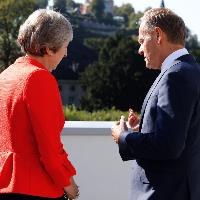(SALZBURG) – EU leaders at a summit Thursday rejected the ‘Chequers plan’ of UK prime minister Theresa May, saying its framework for economic cooperation would not work, and risked undermining the single market.
At the informal meeting of European leaders, EU Council president Donald Tusk said the moment of truth for Brexit negotiations would come at the next European Council meeting in October.
His remarks came after a working lunch of the EU 27 (without the UK) covering Brexit, where the leaders once again reconfirmed the EU’s “full unity”.
Mr Tusk said that first, they re-confirmed that “there will be no withdrawal agreement without a solid, operational and legally binding Irish backstop”, and that EU members would continue to fully support the EU’s chief negotiator Michel Barnier in his efforts to find such a model.
Second, they agreed that they would have a joint political declaration which “provides as much clarity as possible on the future relations”. Acknowledging some “positive elements” in the Chequers proposal, the leaders said the suggested framework for economic cooperation would not work, “not least because it risks undermining the single market”.
Finally, regarding the timetable for negotiations, Mr Tusk looked forward to “maximum progress and results in the Brexit talks” in October: “Then we will decide whether conditions are there to call an extra summit in November to finalise and formalise the deal,” he added.
Also at the summit, the leaders discussed the latest developments in the area of migration.
Taking note that the number of irregular arrivals of migrants had been reduced and “is now even lower than in the years before the crisis”, the heads of state or government agreed to deepen migration cooperation with Egypt and other African countries.
However, Mr Tusk admitted that the migration debate had shown that “it was not possible to reach an agreement on everything”. However, he maintained that the common main goal was to fight illegal migration, strengthen the external borders and intensify the cooperation with third countries.
Internal security was one of the main topics of the informal summit. Heads of state or government took stock of progress achieved and agreed to:
- strengthen European Border and Coast Guard
- step up the fight against all forms of cyber crime, manipulations and disinformation
The issues regarding sovereignty and the size of Frontex would need further discussion.
Informal meeting of heads of state or government, 19-20/09/2018 – main results



